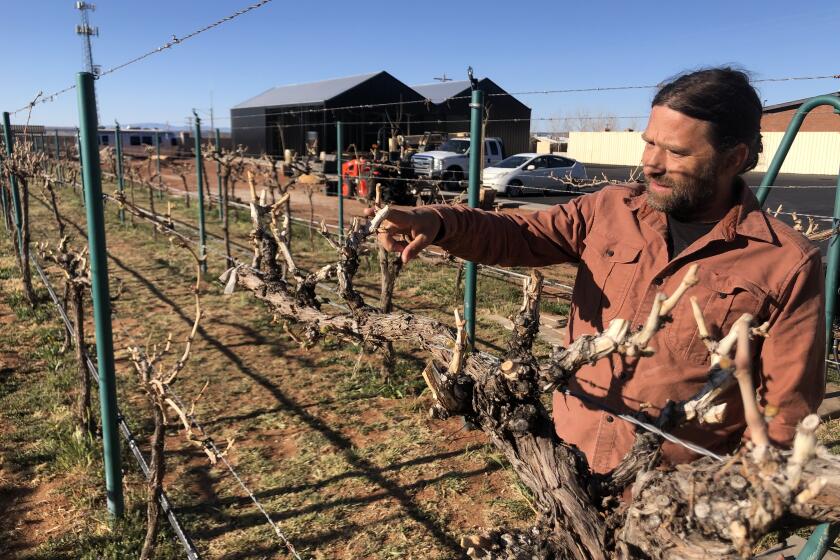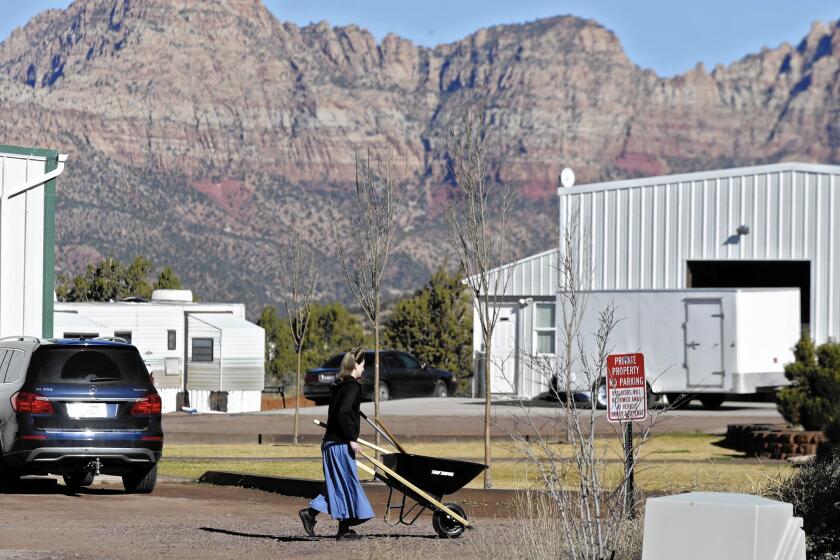Leader of polygamous sect had 20 wives, many of them minors, FBI says

- Share via
FLAGSTAFF, Ariz. — The leader of small polygamous group near the Arizona-Utah border had taken at least 20 wives, most of them minors, and punished followers who did not treat him as a prophet, newly filed federal court documents show.
Samuel Bateman was a former member of the Fundamentalist Church of Jesus Christ of Latter-Day Saints, or FLDS, until he left to start his own small offshoot group. He was supported financially by male followers who also gave over their own wives and children to be Bateman’s wives, according to an FBI affidavit.
The document filed Friday provides new insight into what investigators have found in a case that first became public in August. It accompanied charges of kidnapping and impeding a foreseeable prosecution against three of Bateman’s wives: Naomi Bistline, Donnae Barlow and Moretta Rose Johnson.
Bistline and Barlow are scheduled to appear in federal magistrate court in Flagstaff, Ariz., on Wednesday. Johnson is awaiting extradition from Washington state.
The women are accused of fleeing with eight of Bateman’s children, who were placed in Arizona state custody earlier this year. The children were found last week hundreds of miles away in Spokane, Wash.
Bateman was arrested in August when someone spotted small fingers in the gap of a trailer he was hauling through Flagstaff. He posted bond but was arrested again and charged with obstructing justice in a federal investigation into whether children were being transported across state lines for sexual activity.
Not so long ago, Short Creek was a haven for polygamists and headquarters of one of America’s most extreme religious sects. Now women hold political office.
Court records allege that Bateman, 46, engaged in child sex trafficking and polygamy, but none of his current charges relates to those allegations. Polygamy is illegal in Arizona but was decriminalized in Utah in 2020.
Arizona Department of Child Services spokesman Darren DaRonco and FBI spokesman Kevin Smith declined to comment on the case Tuesday. Bistline’s attorney didn’t respond to a request for comment, and Barlow’s attorney declined to comment. Johnson didn’t have a publicly listed attorney.
The FBI affidavit filed in the women’s case largely centers on Bateman, who proclaimed himself a prophet in 2019. Bateman says he was told by former FLDS leader Warren Jeffs to invoke the “Spirit of God on these people.” The affidavit details explicit sexual acts that Bateman and his followers engaged in to fulfill “Godly duties.”
Jeffs is serving a life sentence in a Texas prison for child sex abuse related to underage marriages.
Decades and decades ago, members of a breakaway fundamentalist faction of the Mormon Church fled their Utah home, most choosing the remote corners of North America to live in isolation.
Defense attorney Michael Piccarreta, who represented Jeffs on Arizona charges that were dismissed, said the state has a history of trying to take a stand against polygamy by charging relatively minor offenses to build bigger cases.
“Whether this is the same tactic that has been used in the past or whether there’s more to the story, only time will tell,” he said.
The office of Bateman’s attorney in the federal case, Adam Zickerman, declined to comment Tuesday.
Bateman lived in Colorado City, Ariz., among a patchwork of devout members of the polygamous FLDS, former church members and those who didn’t practice multiple marriage. Polygamy is a legacy of the early teachings of the Church of Jesus Christ of Latter-day Saints, but the mainstream Mormon church abandoned the practice in 1890 and now strictly prohibits it.
In ‘Under the Banner of Heaven,’ based on the book by Jon Krakauer, Dustin Lance Black delivers an unflinching portrait of the faith he grew up in.
Bateman often traveled to Nebraska, where some of his other followers lived, and internationally to Canada and Mexico for conferences.
When Bateman was arrested earlier this year, he instructed his followers to obtain passports and to delete messages sent through an encrypted system, authorities said.
He demanded that his followers publicly confess any indiscretions and shared those confessions widely, according to the FBI affidavit. He claimed that the punishments, which ranged from a timeout to public shaming and sexual activity, came from the Lord, the affidavit states.
The children, identified by their initials in court documents, have said little to authorities. The three children found in the trailer Bateman was hauling through Flagstaff — which had a makeshift toilet, a couch, camping chairs and no ventilation — told authorities they didn’t have any health or medical needs, a police report stated.
None of the girls placed in state custody in Arizona disclosed sexual abuse by Bateman during forensic interviews, though one said she was present during sexual activity, according to the FBI affidavit. But the girls often wrote in journals, which were seized by the FBI. In them, several of the girls referred to intimate interactions with Bateman. Authorities believe the older girls persuaded the younger ones not to talk about Bateman, the FBI said.
More to Read
Sign up for Essential California
The most important California stories and recommendations in your inbox every morning.
You may occasionally receive promotional content from the Los Angeles Times.












